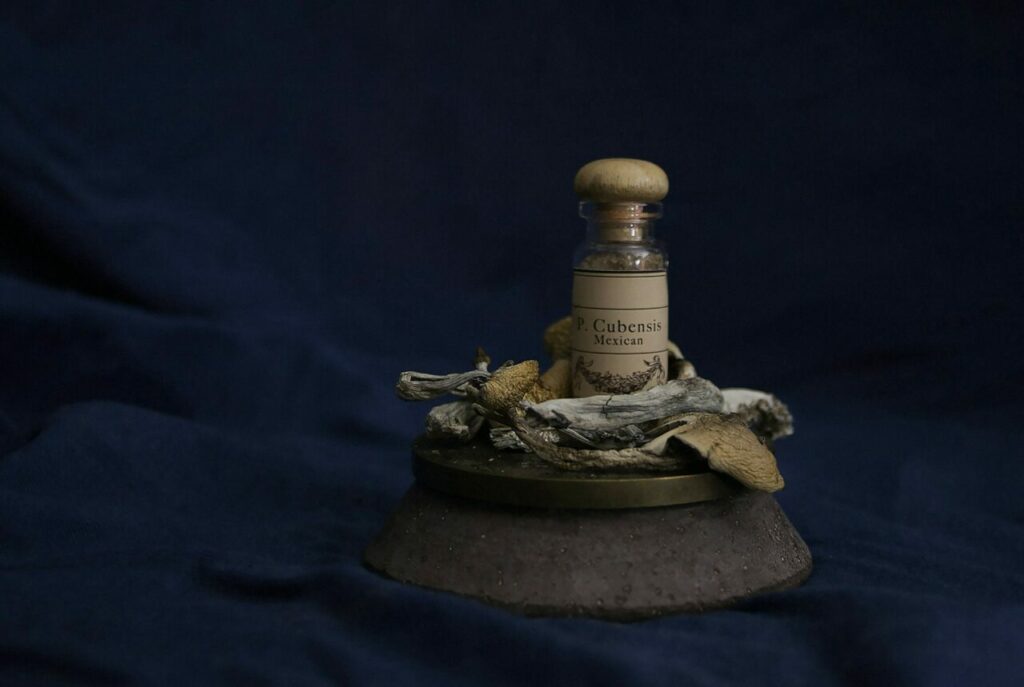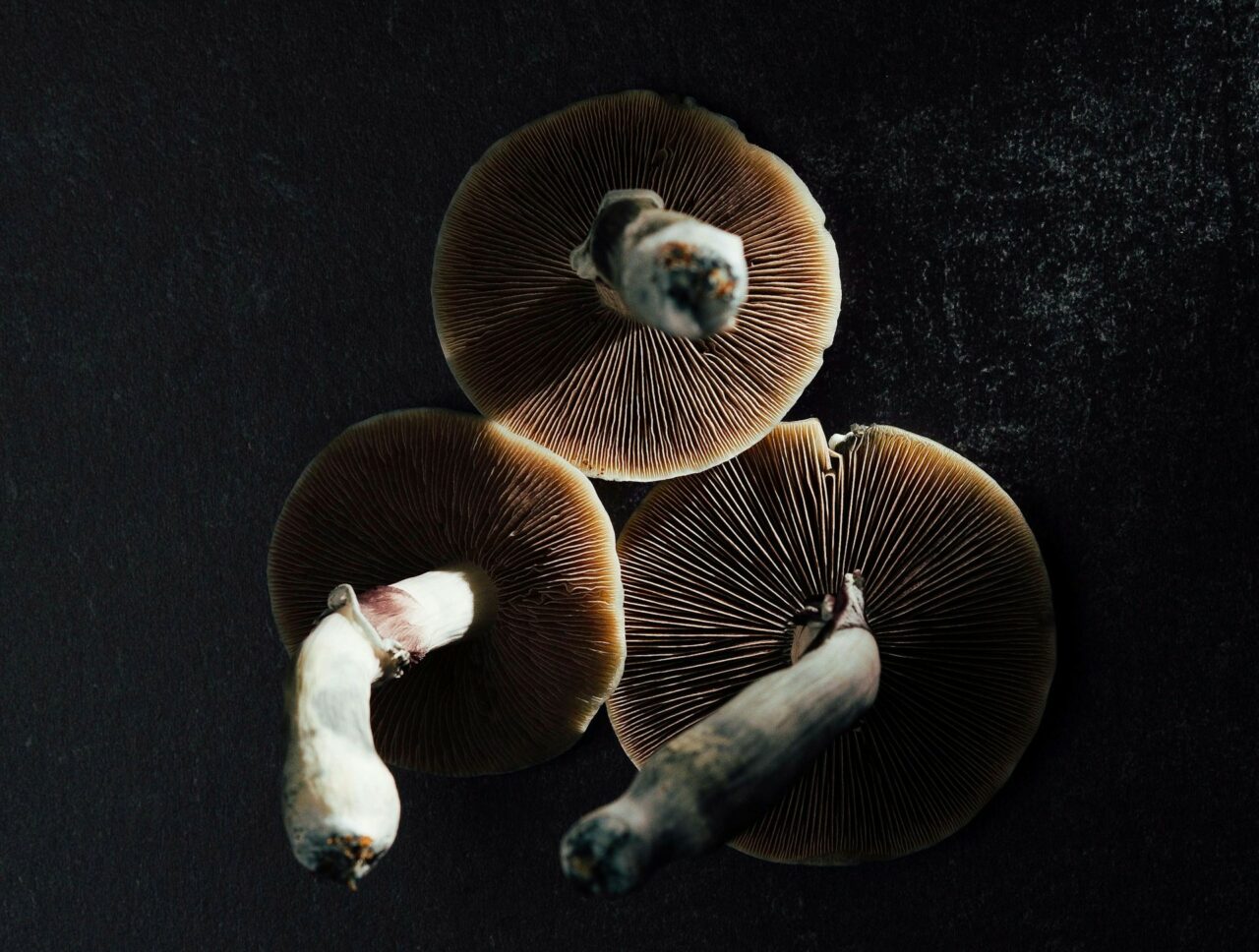The growing interest in natural magic mushrooms in Canada has led to a simultaneous increase in the popularity of lab-manufactured psilocybin products. These lab-grown alternatives are favored by many researchers due to their precise dosage. However, it’s important to note that natural mushrooms can potentially be more potent than their lab-created counterparts. The stark differences between the two, including varying potency levels, are emphasized by experts.

Key Takeaways:
- There are over 180 species of natural mushrooms, each offering different levels of potency. The effects experienced can be influenced by factors such as the species, consumption method, cultivation process, and individual tolerance.
- Synthetic psilocybin, a lab-engineered version of the organic compound, is manufactured in controlled environments for the assurance of consistency and purity. This is particularly important for clinical research, especially in the field of mental health treatments.
- The combined effects of various compounds found in psychedelic mushrooms, like psilocin and baeocystin, can lead to a more intense and profound experience than a single compound alone.
The Growing Market: Psychedelics in Diverse Forms
Psilocybin mushrooms are rapidly gaining popularity in Canada, especially as a treatment for various mental health conditions such as OCD, depression, PTSD, and anxiety. This surge in interest has prompted provincial governments to consider decriminalizing their recreational use.
In 2020, Canada allowed the restricted medical use of these mushrooms under specific conditions. Just a year later, the federal government extended the permission to certain terminally ill patients for symptom management.
This forward-thinking approach has paved the way for the birth of synthetic psychedelics.
The Ongoing Debate
The continuous discussion surrounding organic versus synthesized psychedelics is centered around safety, accessibility, and cost considerations.
While many believe that natural psychedelics provide a more authentic and traditional experience, supporters of synthesized variants emphasize their advantages in terms of standardized application for medical use, guaranteed dosage control, and quality assurance.
Although the production of lab-created psychoactive substances could enhance accessibility, there are lingering worries about potential drug monopolization. Critics argue that this could result in less accessibility and amplified expenses for users.
/wp:paragraph –>Comprehending Psilocybin: A Comprehensive Guide
Psilocybe cubensis, a variant of magic mushroom, is among the numerous naturally occurring psychedelic substances available in the present day. Magic mushrooms, recognized for their psychoactive effects, come in a variety of strains such as Golden Teachers, Amazonian Cubensis, Blue Meanies, and more, with Psilocybe cubensis being the most notable family.
Deciphering the Psychedelic Process
Psilocin, a derivative of this mushroom, undergoes chemical transformation upon metabolism by the liver. This altered compound engages with the brain’s serotonin receptors, especially the 5-HT2A receptor.
This receptor is pivotal in the regulation of mood, cognitive functions, and perception. Its interaction with the transformed compound disrupts the usual functioning of serotonin pathways, resulting in modified visual and auditory perception, changes in thought processes, and emotional states. This occurrence leads to enhanced mood, augmented creativity, introspection, and the so-called “psychedelic” experiences.
Two Main Categories
| Natural | Found in more than 180 species of fungi, the potency can vary depending on the mushroom species. Psilocybe cubensis is a common type. The effects may vary based on consumption methods, cultivation practices, and individual tolerance. |
| Synthetic | Generated in laboratories and chemically identical to natural compounds. They’re made in controlled environments to maintain consistency and purity. These are progressively being explored for clinical applications, particularly in the realm of mental health treatments. |
Gifts of Nature vs. Creations of Science: The Fundamental Differences
Natural versions of these drugs are discovered in specific species of magic mushrooms. Indigenous communities in North and South America have incorporated these mushrooms in their rites and ceremonies, deeming them as sacred or divine.
- Obtained from plants and mushrooms
- Utilized in ancient rituals and healing customs
- The unique genetic composition of each strain influences its potency
On the other hand, the
A laboratory-produced drug is
These substances are designed to closely mimic the natural chemical composition of specific compounds. Expertly crafted in regulated conditions by skilled professionals, these drugs perform much like their natural counterparts. However, their influence on the overall psychedelic experience can be subtly different.
- Produced by experienced pharmaceutical experts
- Recent advancements made specifically for medicinal use
- Consistent potency due to a strictly monitored manufacturing process
Natural substances often provide more benefits due to their bioactive ingredients. Various types of mushrooms contain different levels of psilocybin and other compounds, resulting in varied effects.
Researcher Insights
A study carried out by the Hebrew University found that psychedelic mushrooms can have a more potent and longer-lasting effect on synaptic plasticity than their synthetic counterparts. The researchers observed the drug’s impact on mouse brain activity by studying changes in behaviour and specific brain chemicals.
The study discovered that the extract reduced head twitching and promoted the growth of new brain connections, suggesting that mushroom extracts could provide more benefits than a solitary compound.
The research team also introduced the “entourage effect”, defining it as the combined impact of multiple compounds in psychedelic mushrooms potentially being more powerful than the effects of individual compounds. In the case of mushrooms, psilocin, baeocystin, and other tryptamines might synergistically create a profound experience.
These extra chemicals are not found in lab-produced substances, possibly resulting in subtly different effects even if the psychedelic content is the same.
Experts on Nature’s Superiority
Research consistently suggests that psilocybin, in all forms, shows promising results for treating various psychiatric disorders. A 2024 study examining the effects of controlled substances on patients with treatment-resistant depression found that symptoms decreased following the administration of magic mushrooms.
When combined with other treatments, natural psychedelics may promote deeper emotional exploration and insights during therapy sessions, thereby improving long-term results.
Researchers from the same university have noted that hallucinogenic mushrooms boost synaptic plasticity. These mushrooms possess a unique metabolic profile that affects oxidative stress and energy production pathways, unlike laboratory-created psychedelics.
Impact on the Market
The growing body of research on this subject could potentially shape the attitudes and buying behaviors of Canadians towards psychedelics. Early efforts by Health Canada, like the Special Access Program, are already hinting at the possibility of future legalization and a shift in therapeutic practices. Psilocybin-assisted therapy may soon become a top treatment method.
As we progress, the importance of organic options is expected to rise, particularly in clinical trials and therapeutic settings. As the country edges closer to fully exploiting the benefits of organic psychedelics, major breakthroughs in mental health solutions appear to be on the horizon.
How to Safely Acquire Shrooms in Canada
- Section 56 Exemption: Health Canada recognizes that psilocybin could be an alternative treatment for patients with severe medical conditions. This exemption is part of the Controlled Drugs and Substances Act.
- Clinical Trials: Initial clinical trials have been approved to investigate the drug’s potential in treating mental health disorders. Participants must meet specific criteria and pass a physician’s assessment.
- Online Marketplace: Psilocybin capsules or edibles can be purchased from online vendors in Canada, but ensure you buy from reliable sources.
Exploring the Power of Natural Compounds
Nature is abundant with marvels, and shrooms are one such example. Instead of opting for synthetic psychedelics, why not try the naturally potent magic mushrooms from Canada? They’re therapeutic and powerful. Discover the best, naturally sourced shroom strains at Microdosing Mushrooms Canada.
The shrooms we sell exceed the standard by maintaining their purest and most genuine form in a dried state. Make a purchase today and have your chosen products conveniently and discreetly shipped right to your doorstep.
Frequently Asked Questions
What are baeocystin and norbaeocystin?
Baeocystin and norbaeocystin are both tryptamine or indole alkaloids. They are chemically akin to psilocybin. These tryptamine derivatives serve as secondary alkaloids in shrooms, enhancing the overall psychedelic experience, though at a lesser intensity. Baeocystin and Norbaeocystin have similar chemical structures, but
They exhibit varying effects due to their differing psychoactive properties.
Do organic dried mushrooms comprise capsules and edibles?
The experience may differ based on the origin. Products rich in organic compounds are offered by online dispensaries, facilitating a comprehensive entourage effect. In contrast, synthetic compounds in capsule form are typically utilized in clinical trials and clinics.
Do natural psychedelics offer more profound experiences?
It’s crucial to acknowledge that expecting a profound experience from a natural psychedelic might bring about that exact outcome. After all, our anticipations, which are part of the ‘set,’ can guide the journey. Natural psychedelics are frequently linked with ceremonial traditions, and this ritualistic setting could lead to uniquely enriching experiences. These experiences are markedly different from clinic sessions involving synthetic compounds in many ways.





